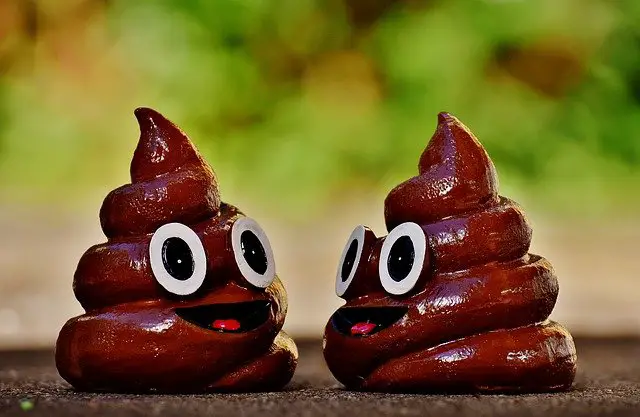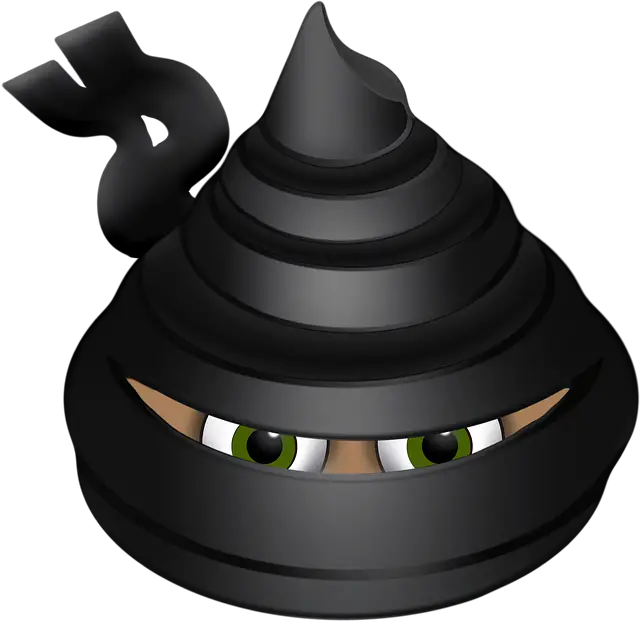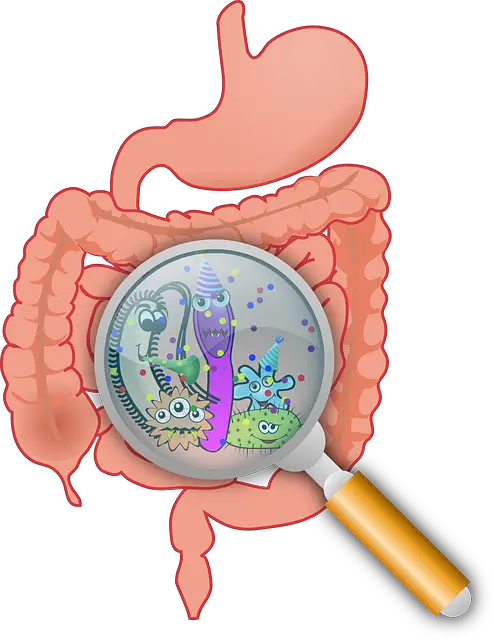Why is my poop black? You’re not the only one asking this question so don’t worry we’ve got you covered.

Feces is the medical term applied to the motions or discharge of the rectum. Also known as “stools” or “crap” or a word beginning with the letter S and ends with HIT. As well as the family-friendly version: “POOP“!
The colon reserves what remains of food after digestion in the small intestine. Mass peristalsis thrusts the feces down to the rectum for evacuation. Then you poop it out!
They vary with the nature of the diet – being dark in color with a meat diet and lighter with a milk diet. They are also affected by the state of a person’s health.
Black stools may result from the administration of iron, bismuth or manganese, and also from the presence of altered blood from some bleeding high up in the alimentary tract.
In young children suffering from diarrhea, the stools are green due to the bacterial decomposition.
In constipation, the stools are drier and harder than normal and often take the shape of round balls coated with mucus.
The intensity of the odor depends to a considerable extent upon the amount of meat eaten.
How it happens
If you were to eat a sandwich, after it enters the stomach, it will be digested, absorbed, and processed by the liver. But most of the lettuce remains as indigestible cellulose at the end of the ileum.
It passes, together with great quantities of gastric secretions and other debris through the ileocaecal valve into the caecum, the pouch at the start of the colon, the main part of the large intestine.
The principal function of the large intestine is the retrieval of water and important chemicals by reabsorption into the bloodstream. The colon disposes of the waste material-all that remains of the ham sandwich eaten many hours before through the anus in the form of feces.
7 Types of Poop

The Bristol Stool Scale or Bristol Stool Chart is a medical aid designed to classify the form of human feces into seven groups [4]. It was developed by Heaton and Lewis at the University of Bristol and was first published in the Scandinavian Journal of Gastroenterology in 1997.
Feces is the waste material discharged by the bowels after the digestion of food. As well as food residue the feces, or stools, also contain bile, mucus and large quantities of bacteria that have helped in the process of digestion. The two most commonly associated problems are constipation and diarrhea. Blood in the stools is an indication of some abnormal condition and should be reported to your doctor.
The form of the stool depends on the time it spends in the colon.
The seven types of poop are:
- Type 1: Separate hard lumps, like nuts (hard to pass)
- Type 2: Sausage-shaped, but lumpy
- Type 3: Like a sausage but with cracks on its surface
- Type 4: Like a sausage or snake, smooth and soft
- Type 5: Soft blobs with clear-cut edges (passed easily)
- Type 6: Fluffy pieces with ragged edges, a mushy stool
- Type 7: Watery, no solid pieces (entirely liquid)
Types 1 and 2 indicate constipation, with 3 and 4 being the “ideal stools” especially the latter, as they are the easiest to pass. 5-7 being further tending towards diarrhea.
Why is my poop BLACK?
Why is my poop black? Yes, this is not a typical dinner table topic. Black or dark feces can be caused by blood in your stool. That is serious business. If you’re experiencing black poop here are some reasons for it that may surprise you.
A black, tar-like stool could be caused by something as harmless as the bismuth in Pepto Bismol. That’s the good news, but if you haven’t had anything similar to that product and you are experiencing black poop, you should see a doctor.
Some common causes of black poop:
Dark colored food: Did you eat something that’s very blackish in color or has dark food coloring in it? The dark pigment in some food can cause your poop to be black and it’s nothing to worry about if that’s the case.
Medicine & Supplements: Some types of medicine and supplements can cause your stool to be black in color. Supplements that cause dark-black stool include iron supplements, Bismuth Subsalicylate, Black Licorice, and Blueberries.
If your poop looks black like tar, that can be due to something more serious like gastrointestinal bleeding.
Stomach Ulcer is another common cause of black stool. Some symptoms of stomach ulcer include vomiting, bloating, weight loss, and lack of appetite.
Melena: This is black tarry poop which is the result of blood present in or on the stool because of bleeding in the digestive tract [1].
When to contact your doctor:
If you suffer any of the following symptoms along with black poop, it’s time to get yourself checked out ASAP!
- Vomiting
- Vomiting blood
- Dizziness
- Blood in poop
Although it’s not always serious, black poop can sometimes be the earliest indicators of more serious diseases like liver disease, cancer, and GI bleeding.
Peristalsis
Peristalsis eventually pushes enough fecal material into the rectum to distend the rectal wall, stimulating pressure receptors to inform the brain that defecation is necessary [3].
Evacuation is performed as a conscious action by contracting the abdominal muscles, tightening the diaphragm and holding the breath. The anal sphincter, a tight ring of muscle around the anus, opens under the pressure and the feces pass out. In the first year or two of life, the anal sphincter opens unconsciously in an involuntary nervous reflex. In later infancy, the brain brings the action under conscious control.
Poop Abnormalities

A large number of disorders may affect bowel function and cause abnormalities of the feces. If the stools are unusually soft and watery, diarrhea is said to be present; if the stools are excessively hard and are passed infrequently, constipation is said to be present.
Among the disturbances that may cause diarrhea and constipation are infections, irritations, and other disorders of the intestines; allergic reactions; and emotional disturbances.
If there is bleeding from the stomach or small intestine, as in bleeding ulcers, the stool may become black and tarry. If there is bleeding from the large intestine, the feces may contain dark red blood.
In certain diseases affecting the absorption of food material, the stool may become greasy, fatty, bulky, and foul-smelling, indicating an abnormally high-fat content.
If there is an obstruction of the bile duct so that bile does not enter the small intestine, the stool becomes clay-colored. In certain infections of the colon (the last segment of the large intestine) there may be pus in the feces, and in other colon inflammations, large amounts of mucus may be passed with the feces.
Abnormal Color of Bowel Movements
A bowel movement, comprising feces or stools, consists of the remainder of what we eat and drink after it has passed through the digestive system and had all the nutrients removed. It is normally dark brown in color due to a pigment it absorbs from the gallbladder bile on its way through the system.
However, the color may vary according to what we have eaten, e.g. a meal of spinach will lead to dark green movements. If you are taking iron tablets your bowel movements will probably be very dark or black.
If you have very dark or black bowel movements (melaena) and you are not taking iron tablets, it may be a sign of bleeding in the digestive tract, possibly from a stomach ulcer, and you should get prompt medical advice.
Bowel movements that are unusually pale can indicate that your digestive system is not absorbing the food properly, or, if your eyes look yellow as well, that you have a gallbladder or liver disease such as hepatitis. It can also signal cancer of the pancreas so expert diagnosis is essential.
If you notice blood in your bowel movements you may have a minor problem such as a tear in the anus or hemorrhoids (piles) but, especially if you feel unwell and have a temperature, it may mean something much more serious is amiss in your digestive tracts, such as inflammation of the colon or rectum, or dysentery caused by an infection, which may need treatment with antibiotics.
Too Much Poop
Sometimes the desire to pass a bowel movement is continuous or recurs overly frequently, without the production of significant amounts of feces. Possibly there may be small amounts of mucus or blood.
This is an uncomfortable symptom and may be due to the condition called irritable bowel syndrome which can cause either constipation or diarrhea and for which stress seems to be the main known cause.
The growth of polyps (small benign growths from the mucous membrane lining of the rectum) may give rise to a desire to defecate. These will need to be surgically removed but the operation is quite simple and straightforward.
Other disorders are more serious and include prolapse (downward displacement) and cancer of the rectum.
Runny Poop

This consists of the excessive discharge of watery feces from the bowel and is a symptom of many diseases. It is commonly associated with intestinal catarrh. As with constipation, the causes of diarrhea are many: they may be summarized into primary and secondary groups.
Before discussing the treatment of diarrhea, it is necessary to emphasize that this condition is merely a symptom common to a number of diseases and is in no sense to be regarded as a disease per se.
Although diarrhea frequently is evidence of some trivial indisposition, yet the possibility of its association with a grave complaint renders it a symptom which must never be regarded lightly. It is to be remembered that it is a principle of curative medicine never to treat a symptom without first endeavoring to investigate and treat the underlying cause.
If this principle is lost sight of, much harm may be done, for a relieved symptom creates a false feeling of security and, the disease progressing undercover, valuable time and opportunity may be lost. To imagine the sufferer is cured is to court disaster.
No Poop
Constipation
Normally feces are only present in the rectum for a few minutes before defecation, their arrival there constituting the call of nature. Constipation is a delay in the evacuation of feces; the passing of motions less frequently than 3 times per week constitutes constipation.
SEE ALSO: What causes chronic constipation + remedies
It may take the form of (a) a slow passage of the contents through the intestine to the rectum, (b) delay and difficulty in emptying the rectum, or (c) a combination of the two.
Cause of Constipation
(1) habits- e.g., neglect of the call of nature, sedentary life, or senility
(2) the weakness of muscles, the result of obesity, repeated pregnancies, or ruptured perineum
(3) the character of intestinal contents- the diet may not provide sufficient” roughage,” being deficient in vegetables, porridge, brown bread, fruit, etc, or there may not be sufficient fluid
(4) various causes- e.g., after diarrhea or purgation, and in lead-poisoning, neurasthenia, and intestinal obstruction.
Symptoms of Constipation
The complexion is muddy, tongue furred, and appetite poor; the evacuations are hard and insufficient, and often accompanied by mucus. Fecal masses can sometimes be felt in the abdomen, and there may be pain from irregular intestinal contractions.
The general symptoms of constipation include straining, lumpy or hard stools, less than 3 times bowel movements per week, and blockage sensation in the anus/rectum [2].
Neglected constipation may give rise to general ill-health, as shown by boils, sores, anemia, intra-abdominal pressure may cause palpitation, hemorrhoids or a hernia; diverticulitis and dilatation · of the intestine may also result.
Treatment of Constipation
Everyone should endeavor to secure a daily normal stool; a short rest after breakfast often permits the stimulus to develop. Walking or another exercise should be taken, and massage- and electricity are useful. The diet should include porridge, wholemeal bread, apples, prunes, figs, oranges, and vegetables. Tea, cocoa, rice, cheese, nuts, milk, eggs, salted fish or meats, pastry, and fried foods should be restricted or avoided. A glass of water should be taken half an hour before meals, especially breakfast.
What do you think is the reason for your poop color?
Share your experience in the comments below.